Decorative Stone in Kitchen Interior: Design Photos
In a small room, the design tends to avoid the feeling of 'being in a cave', while in a large one, decorative stone can be used as an attractive element for room zoning for cooking and dining. In any case, this finishing material is unique, interesting in design due to its proximity to natural elements, and practical in areas with high humidity, temperature fluctuations, and mechanical loads.
Stone Decoration Options for the Kitchen
Cladding walls and kitchen design elements with decorative natural stone or its imitation has a wide range of advantages over other building finishing materials: originality, affordable price, wide selection, ease of installation, durability, eco-friendliness, moisture and wear resistance, low maintenance requirements, and adding uniqueness and individuality to the interior. Agree, quite an impressive list to carefully 'look at' this unique finishing material!
Design offers extensive opportunities for using stone in the kitchen:
A small dining area 'loves' light tones. Therefore, using a 'light' but not dark material in the decoration is justified and even preferred. This can be an imitation of slate, limestone, or classic brick. A marble mosaic would look impressive. This brings the interior closer to classical style.
The dining area in a modern style is decorated with decorative stone imitating Jurassic marble and mountain slate.
An attractive look of the kitchen is possible when using decorative stone in the design of the kitchen cabinet's splashback. The gas range, highlighted with brick variations, transforms into an elegant fireplace.
The rest corner accentuated with decorative stone becomes uniquely cozy, 'sending' viewers into the imagination of medieval times.
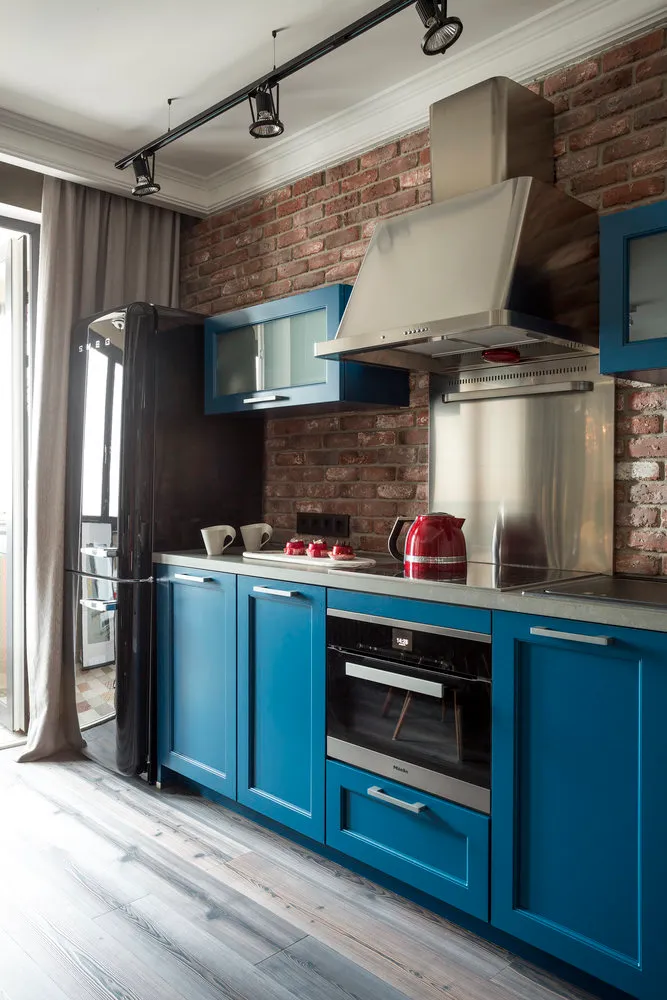
Design: Zhena Zhdanova
The beauty of a stone countertop is enhanced by an arch made from decorative stone.
Originality in design is achieved through various carefully thought-out combinations of decorative stone with other materials: beautiful wood in furniture with marble and granite, wooden floors or ceilings with decorative brick, tables with folk motifs and countertops in 'stone texture'.
It is relevant to use two harmonizing different types of stone finishes in the kitchen decoration and styling. This accentuates the finishing and complements each other.
Slate tile will add an atmosphere of an Alpine chalet to the room, cladding walls 'to the ceiling' creates a sense of visual space and increased height.
Romantic antiquity is accentuated by forged, aged, vintage elements in the decoration of surfaces made from decorative stone.
Cladding the range hood and interior elements that come into contact with the food preparation area creates a fireplace or country stove effect.
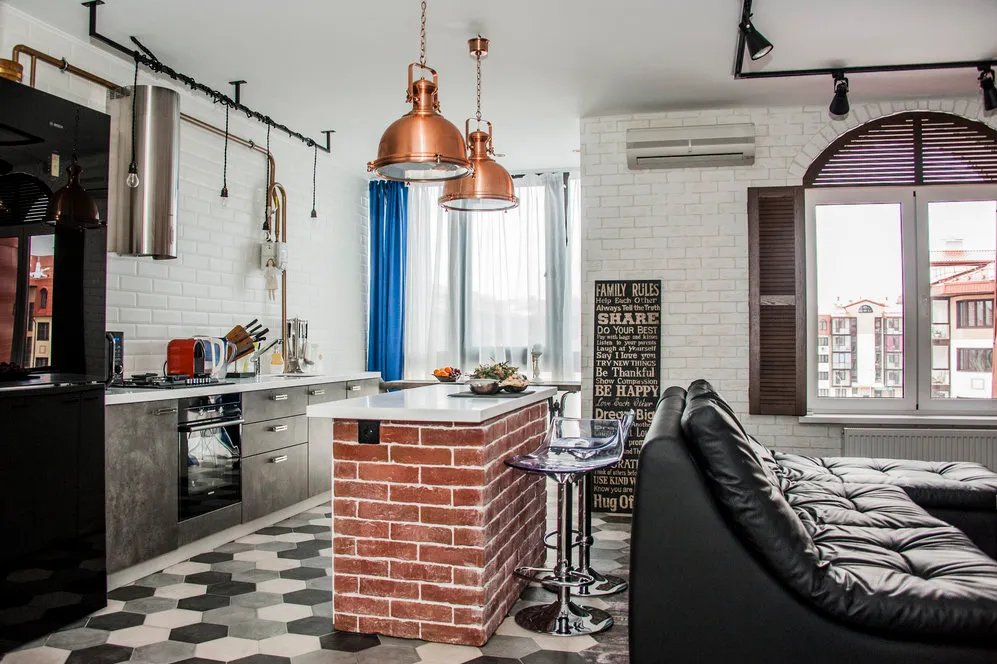
Design and Photo: Kamila Vagapova
Wall Cladding
For cladding with stone, one of the kitchen walls is usually chosen. This helps in zoning and accentuates the surface. A large dining area allows for cladding on adjacent or parallel walls. The design in this case is based on the lighting of the room and the overall stylistic solution.
Walls around windows look stylish in light cladding. It can be done in fragments, not weighing down the visual perception of the kitchen design.
Beige and sandy notes in stone will bring warmth and send imagination to the charm of country life. The cottage style will suggest using materials with minimal processing in a general tone with furniture.
By choosing to clad the corners of the kitchen with stone, one can achieve the effect of decorating the room with columns.
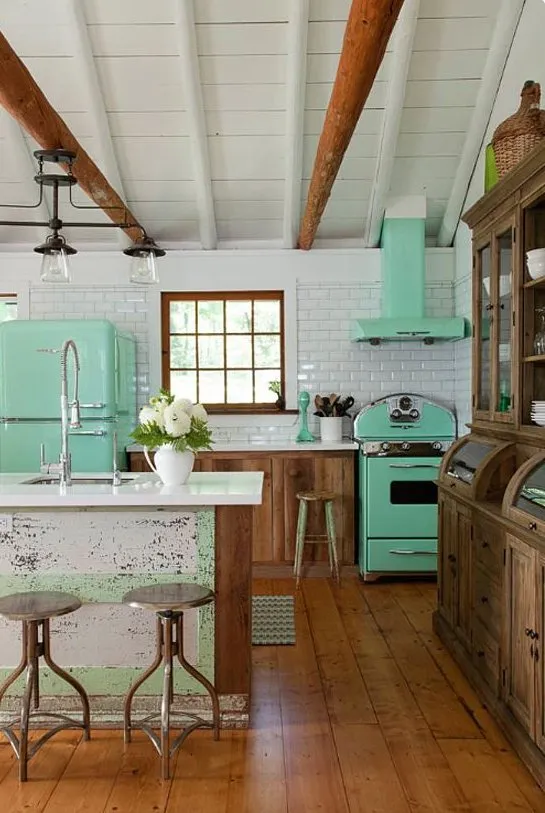
Splashback Cladding
Cladding the splashback with decorative stone is not only beautiful and stylish, but also practical and effective:
a great way to zone parts of the cabinet;
excellent protection from temperature overload;
effective barrier against moisture, dirt, and grease;
long-lasting attractive appearance;
ease of maintenance and care.
Actual cladding imitating stone masonry is suitable for small kitchens with low ceilings. In this case, horizontal masonry in rectangular shape of the chosen material is favorable for visually enlarging the space. The coating can be combined with traditional materials (ceramic tiles, mosaics, glass, plastic, specially processed wood, etc.). The feeling of warmth and comfort is achieved by choosing soft pastel tones in the color palette.
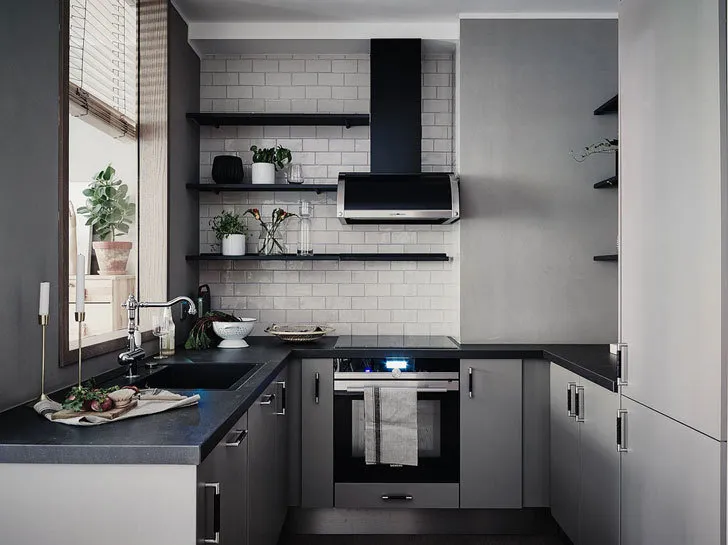
Apartment in Stockholm
Door and Arch Openings
Cladding the door architectural element with decorative stone is relevant and stylish when refusing a door altogether. This option is optimal for large spaces and country houses. In cramped urban conditions, the opening along the perimeter is fragmentedly clad with artificial stone tiles in harmony with the chosen dining room design. In this case, it is appropriate to also decorate the window opening in the same decorative key.
Decorating an arch in light tones will bring a sense of antiquity, highlighting the return to the past through carved, artificially aged furniture, moldings, and forged decorative elements.
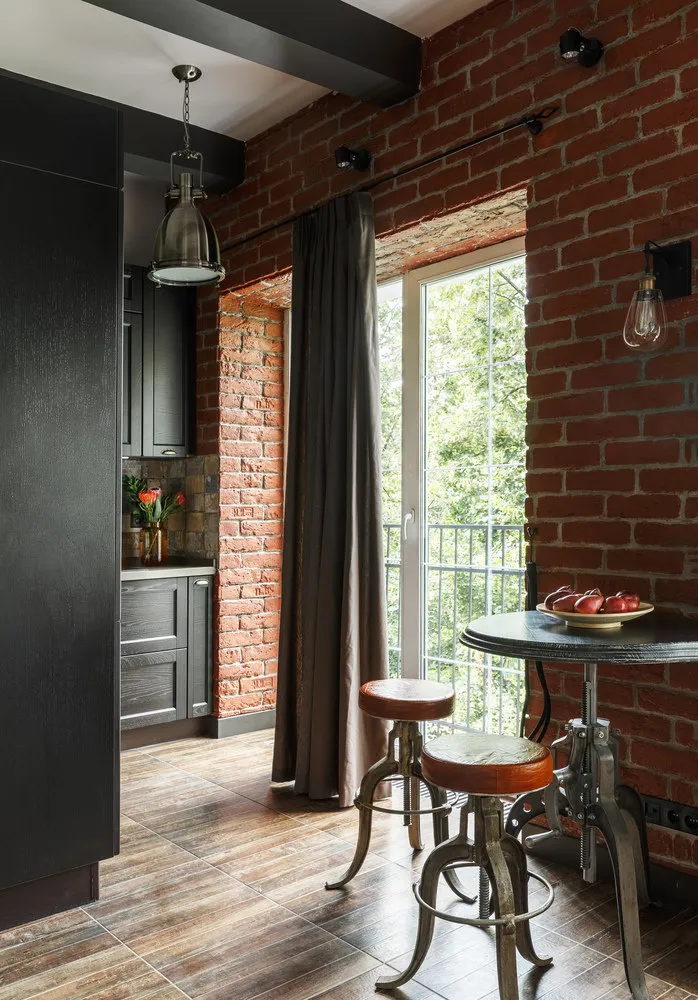
Design: Marina Sarkisyan
Columns, Niches, Corners
Decorating the kitchen corners with stone, as we already know, leads to perceiving the space with columns. The columns themselves in large dining rooms are processed with stone matching the overall kitchen decoration, which includes an abundance of stone 'finishing' on surfaces. The sophistication of column finishing is accentuated by the lighting system. The textured stone reveals itself with point lighting of fragments.
Designedly refined decoration of niches and openings will help create the effect of an additional arch. It, in turn, is meant to 'support' the overall interior appearance dedicated to decorative stone and its harmony. A positive practical point can be named as hiding construction flaws under the stone coating.

Choosing Material for Kitchen Cladding
Decorative stone is quite complex in technological terms as a building product. During its manufacturing, gypsum, perlite, sand, concrete, and expanded clay are used as a base. The combination of components allows achieving the required strength and shape.
Wild stone requires extensive additional processing: from polishing to cutting.
When choosing material for cladding surfaces with stone, several important criteria are considered:
application: in 'gentle' zones or areas with high contamination and mechanical loads. Artificial stone has different frost resistance indicators, which are a criterion for strength and durability of the product. Fire resistance and eco-friendliness also vary.
thickness of the material and its uniformity: depends on the requirements of the designer's project, aimed at making the interior harmonious and beautiful. Processing stone surfaces with gypsum board requires thin material. Large deviations in its front side can affect the thoroughness of leveling the entire surface.
stone quality: it is important when using composite materials. Layered structure indicates an excess of expanded clay. Optimal: fine fraction located closer to the facade side (sand), followed by coarse (expanded clay).
paint quality: it depends on the filler used and the parameters of the paint itself. It is not practical to buy finishing material only with a painted front side: mechanical damage will immediately 'reveal' all manufacturing flaws.

Artificial Stone
Advantages of using artificial stone:
light weight;
wide selection;
small amount of adhesive used.
Different types of building finishing materials are available:
- cast;
- concrete;
- gypsum.
Artificial cast stone is made of acrylic composite material or cast marble. It is used for cladding countertops, fireplace shelves, window sills, consoles, fireplace arches and shelves.
Concrete imitates wild stone, brick, cobblestone, pebbles. It is used in the decoration of wall surfaces, arches, entrance and fireplace arches. It is also used to create volumetric formed stone boulders that serve as decoration.
Gypsum, decorated to look like stone using casting, is used for decorating columns, capitals, cornices, wall reliefs, wall vignettes, moldings, niches, and elements of classical style finishing.

When using artificial stone in interior decoration, it is important to correctly select the grout. It can be slightly lighter or darker than the main tone but should 'support' it under any circumstances. The width of the joint depends on the area of the 'stone' fragments: from 3 to 15 mm.
If stone masonry becomes the background of the interior, the grout maintains the main tone. Decorative panels made from artificial stone suggest a lighter grout. Dark grout is good for imitating wild stone to emphasize the complex, deep natural texture.

Wild Stone
The very name implies exclusively natural origin. It has enormous variations in form and color. Industrial technologies have mastered various methods of its processing: from mirror surface to all kinds of facade geometry. In the world, there are 3D machines capable of cutting various monolithic configurations from marble up to 5 meters in perimeter.
The criteria for positive qualities of wild stone in the kitchen interior are similar to artificial variants with one important caveat: natural material still cannot replace artificial analogs. The pros in order:
possibility of selecting weight;
ease of work;
ease of maintenance;
ecofriendliness;
durability;
harmony with any stylistic solution;
attractive and impressive external appearance.
In kitchen interior design, malachite, jasper, pebbles, natural crystal, and slate are used. However, the most 'recognized' material is marble and granite.

Granite as a building and finishing material has been known since ancient times. It is strong and reliable in various natural colors. The full depth of color cannot be matched by industrial methods. Therefore, walls 'processed' with granite are always unique in their elegance. Moreover, they are long-lasting and extremely low-maintenance. You can admire them as works of art!
Marble is remembered for its smooth 'flowing' of various shades, creating a play of shadows and volumetric shifts. It is distinguished by high heat resistance and anti-corrosion properties, able to preserve the item for centuries. This material is widely used not only in wall and floor finishing but also always applicable in decoration and artistic styling of spacious, bright rooms in classical style and modern style.
Wild stone in the interior always combines with natural wood, metal, and glass. These materials also have a natural basis and rich history. Therefore, Feng Shui suggests actively using them in living spaces: the energy accumulated in nature positively affects health, mood, and overall well-being of the whole family.

Design: Vera Tarlovskaya
Kitchen Style with Decorative Stone
Modern style is practical and convenient without excessive decorative accents in abundance of light and air. To reveal the depth of the space and its uniqueness, stone in decoration and finishing helps. It is most harmonious in the loft stylistic direction. Hi-Tech has also long 'taken a look' at the pros of 'stone presence'.
Shale style, 'sending' us to the origins of highland shepherd's hut, naturally 'loves and values' stone. Beams on a high ceiling pair perfectly with natural material, readily found on mountain landscapes. We keep this thought in mind when encountering exotic styles for our spaces.
Cottage style with spacious rooms and large windows harmonizes well with abundant stone cladding, best when wild, as wood here also does not require meticulous work. A kitchen with a fireplace made of natural brutal stone is the classic of the genre.

Design: Irina Lavrentieva
Grandeur and sophistication of English style are accentuated by pink and white marble, mother-of-pearl, malachite in milky beige-coffee tones in the dining room interior.
Modern style, choosing smooth forms, tends to wooden beams on the ceiling and stone walls, marble kitchen islands. All of this is combined with glass and metal.

















Design: Pavel Naumenko and Alexander Kozlov

















Design: Marina Sarkisyan







Design: Milla Kuniakina

Apartment in Stockholm

Design: Irina Lavrentieva











Design: Daria Chaplygina, Julia Pekker, Juicy Hall Studio





Design: Zhena Zhdanova




Design and Photo: Kamila Vagapova


Video on the Topic:
Need a renovation specialist?
Find verified professionals for any repair or construction job. Post your request and get offers from local experts.
You may also like
More articles:
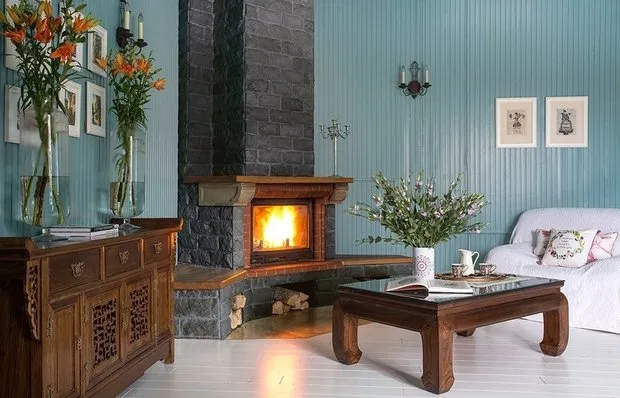 Country Style in Interior Design with Photos
Country Style in Interior Design with Photos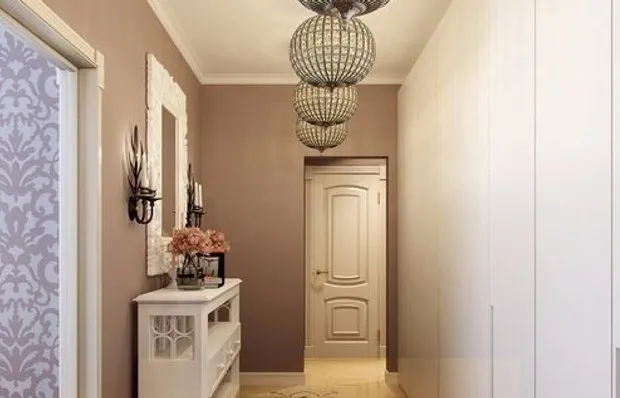 Ceiling in Hallway with Photo
Ceiling in Hallway with Photo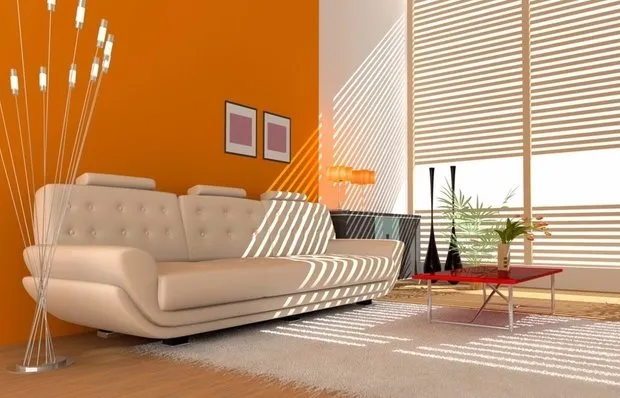 Orange Color in Interior Design
Orange Color in Interior Design Autumn Ends – Discounts Continue: 6 December Promotions
Autumn Ends – Discounts Continue: 6 December Promotions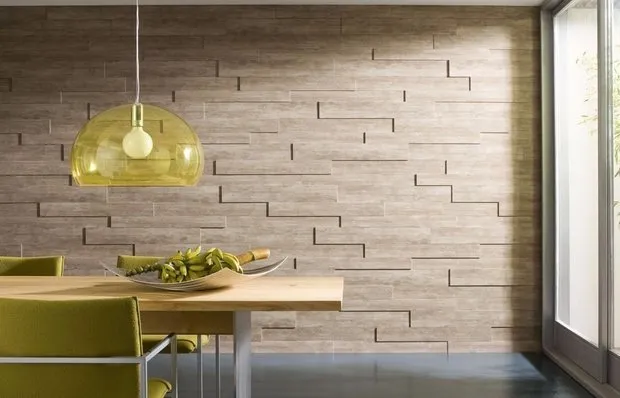 MDF Panels for Walls: Interior Photos
MDF Panels for Walls: Interior Photos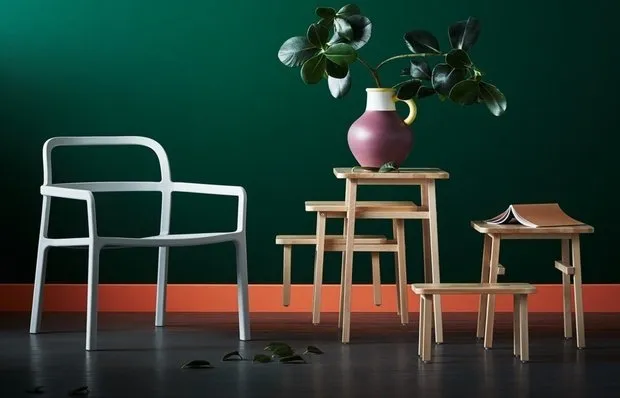 10 Items from IKEA's New Collection That You Will Love
10 Items from IKEA's New Collection That You Will Love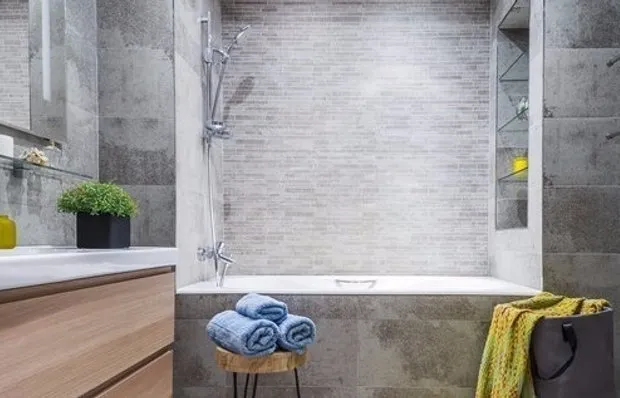 Bathroom Design 5 Square Meters with Photos
Bathroom Design 5 Square Meters with Photos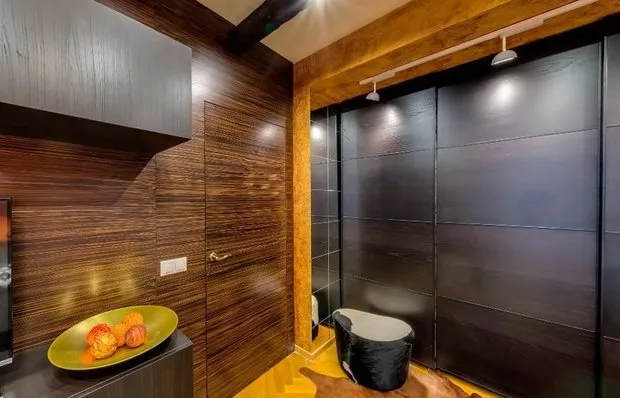 Dark Doors in Interior Design
Dark Doors in Interior Design